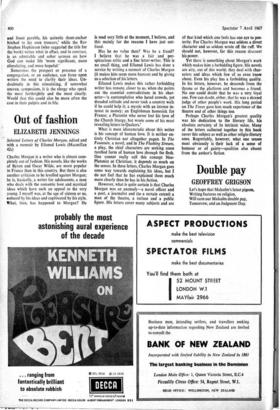Out of fashion
ELIZABETH JENNINGS
Selected Letters of Charles Morgan, edited and with a memoir by Eiluned Lewis (Macmillan 42s) Charles Morgan is a writer who is almost com- pletely out of fashion. His novels, like the works of Byron and Oscar Wilde, are more popular in France than in this country. But there is also another criticism to be levelled against Morgan; he is, basically, a writer for adolescents, a man who deals with the romantic love and mystical ideas which have such an appeal to the very young. I myself was, at the age of sixteen or so, seduced by his ideas and capitivated by his style. What, then, has happened to Morgan? He is read very little at the moment, I believe, and this mainly for the reasons I have just out- lined.
Has he no value then? Was he a fraud? I believe that he was a fair and per- spicacious critic and a fine letter-writer. This is no small thing, and Eiluned Lewis has done a service by writing a memoir of Charles Morgan (it makes him seem more human) and by giving us a selection of his letters.
Eiluned Lewis makes this rather forbidding writer less remote, closer to us, when she points out the essential contradictions in his char- acter—`a contemplative who hated crowds, yet dreaded solitude and never took a country walk if he could help it; a mystic with an intense in- terest in money; an Englishman homesick for France; a Platonist who never lost his love of the Church liturgy, but wrote some of his most revealing letters to Quakers.'
What is most idiosyncratic about this writer is his concept of human love. It is neither en- tirely Christian nor altogether pagan. In The Fountain, a novel, and in The Flashing Stream, a play, the chief characters are seeking some rarefied form of human love through the flesh. One cannot really call this concept Neo- Platonist or Christian; it depends so much on the senses. In these letters, Charles Morgan goes some way towards explaining his ideas, but I do not feel that he has explained them much more clearly than he has in his fiction.
However, what is quite certain is that Charles Morgan was an anomaly—a naval officer and a poet, a journalist and (to a certain extent) a man of the theatre, a recluse and a public figure. His letters cover many subjects and are of that kind which one feels has one eye to pos- terity. For Charles Morgan was seldom a direct character and so seldom wrote off the cuff. We should not, however, for this reason discount his power.
Yet there is something about Morgan's work which makes him a forbidding figure. His novels are airy, out of this world; they deal with char- acters and ideas which few of us even know about. Even his play has a forbidding quality. In his letters, however, he descends from the throne or the platform and becomes a friend. No one could doubt that he was a very loyal one. Few can doubt, either, that he was a shrewd judge of other people's work. His long period on The Times gave him much experience of the theatre and of other things too.
Perhaps Charles Morgan's greatest quality was his dedication to the literary life, his absolute certainty of its intrinsic value. Many of the letters collected together in this book cover this subject as well as other religio-literary ones. Regrettably, however, what one senses most obviously is their lack of a sense of humour or of gaiety—qualities also absent from the author's fiction.






























 Previous page
Previous page